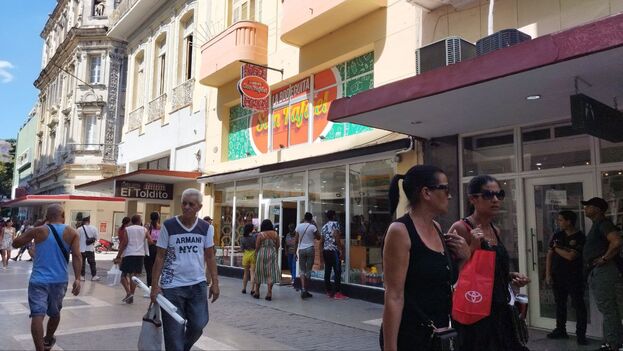
![]() 14ymedio, Juan Diego Rodríguez/Olea Gallardo, Havana, 20 February 2023 — A new market in the heart of Centro Habana, a ration store with various items, a stationery store in the Miramar Trade Center, a fabric and upholstery store in El Vedado, a re-opened Italian pizzeria in the same neighborhood… these establishments have three things in common: they have recently opened or reopened in the capital, they have very high prices, and now — with a new or former name — they are in private hands.
14ymedio, Juan Diego Rodríguez/Olea Gallardo, Havana, 20 February 2023 — A new market in the heart of Centro Habana, a ration store with various items, a stationery store in the Miramar Trade Center, a fabric and upholstery store in El Vedado, a re-opened Italian pizzeria in the same neighborhood… these establishments have three things in common: they have recently opened or reopened in the capital, they have very high prices, and now — with a new or former name — they are in private hands.
In the middle of Boulevard de San Rafael, the colorful poster of a large and well-stocked shop, inaugurated this Saturday, La Bodeguita de San Rafael, is a surprise. “The best of all I’ve seen so far; it’s one of the most beautiful,” said a customer, surprised at what the state clothing store that used to exist in that place had become.
But what left most people speechless were the prices: 34-oz. soft drinks at 450 pesos ($19), condensed milk at 550 ($23), a small tetrapack of tomato puree at 380 ($16), a pound of lentils at 400 ($17), a kilo of wheat flour at 590 ($25), two pounds of rice at 650 ($27), a simple glass of yogurt at 120 ($5).
“A woman spent almost 33,000 pesos ($1,375) in front of me,” said another man who went shopping. “I don’t know what she had in her shopping bags.”
Inside the store, a couple, a foreigner and a Cuban woman were talking. He asked her: “Why do you go to the store in MLC [freely convertible currency] if they sell here in pesos?” She replied: “Because the prices are much higher; they are inflated. For example, that package of rice will cost 2 MLC or $1.90, and here it costs 600 Cuban pesos ($25).”
“It looks like they are reselling things from the MLC stores, but that’s not supposed to happen because it’s not allowed,” speculated an old man.
What seems clear is that, once again, the same scheme of the recently inaugurated grocery store of the Miramar Trade Center is being repeated, the same as what happened with the branches of the Sylvain chain and before that, the Fress. A variety of businesses have now gone from state hands to private hands overnight, without competition or prior notice.
Therefore, the inauguration the same Saturday of a “sodería-hamburger” shop called Complejo Zapata y 12, in that same municipality of Plaza de la Revolución, was striking. It was attended by Luis Antonio Torres Iríbar, first secretary of the Provincial Committee of the Party, and Reinaldo García Zapata, Governor of Havana.
Tribuna de La Habana reflected the same thing in a note published this Sunday. The initiative, reports the official press, is due to the “productive chain” between the state Provincial Company of the Food Industry (EPIA) and the private company Epcc, “with one person responsible.”
In this association, the text released by the director general of the EPIA, Abdelín González Mesa, explains, “The state entity provides the premises, the labor force and the technological infrastructure, while the private company supplies all the imported raw material and is involved in the manufacturing process.”
With this joint production, Tribuna continues, “the private actor has fewer costs and therefore can set more affordable prices for customers,” alluding to the surprising financing of the private company with public resources.
As stated with pomp, the establishment offers “several varieties of ice cream made in the unit itself, using natural fruits collected in the country and from imported components (chocolate, lemon, strawberry, orange and pineapple).” In addition, they boast that the offer “is marketed at prices lower than those currently set by other forms of private management”: the ice cream scoop costs 35 pesos ($1.45), and the simple hamburger costs 150 ($6.25).
This is one of the few occasions in which the official press publishes something related to new private businesses, whose proliferation was ratified by the meeting, last January, between Cuban President Miguel Díaz-Canel and Kremlin adviser Boris Titov.
As revealed by Russian media at the time — not by Cuban officials — both parties agreed to transform Cuba’s economy into a “private enterprise” one. For voices in exile such as the Cuba Siglo XXI ideas laboratory, this means an imminent transition from a “state-controlled economy model” to the “old elite oligarchic Soviet scheme” of taking control of numerous businesses.
Translated by Regina Anavy
____________
COLLABORATE WITH OUR WORK: The 14ymedio team is committed to practicing serious journalism that reflects Cuba’s reality in all its depth. Thank you for joining us on this long journey. We invite you to continue supporting us by becoming a member of 14ymedio now. Together we can continue transforming journalism in Cuba.
